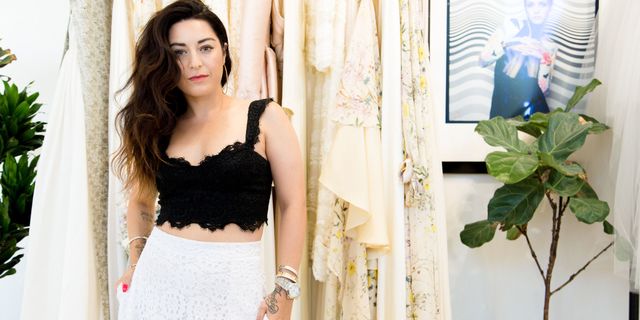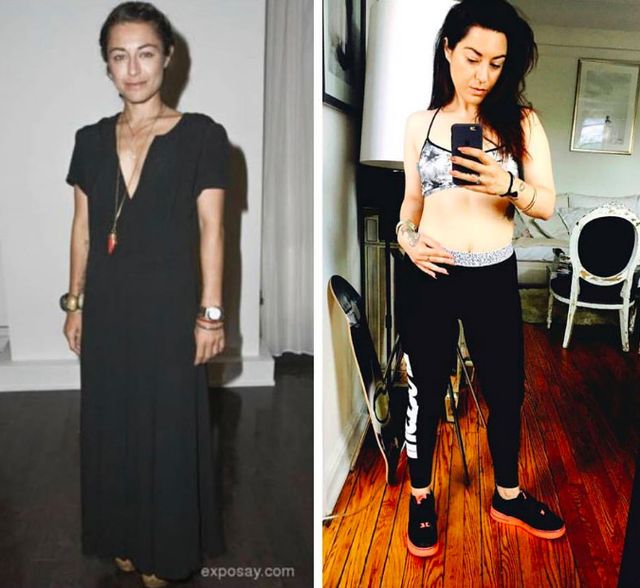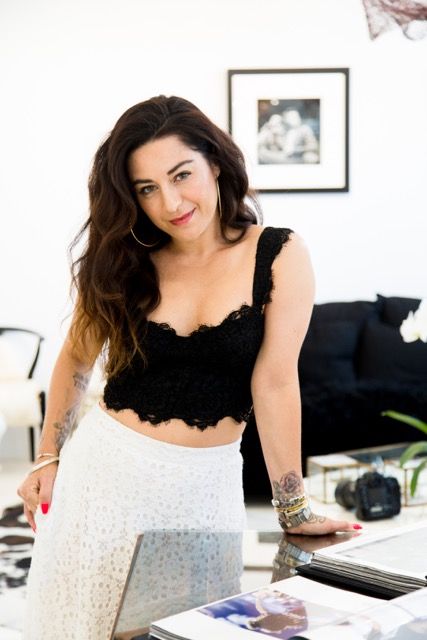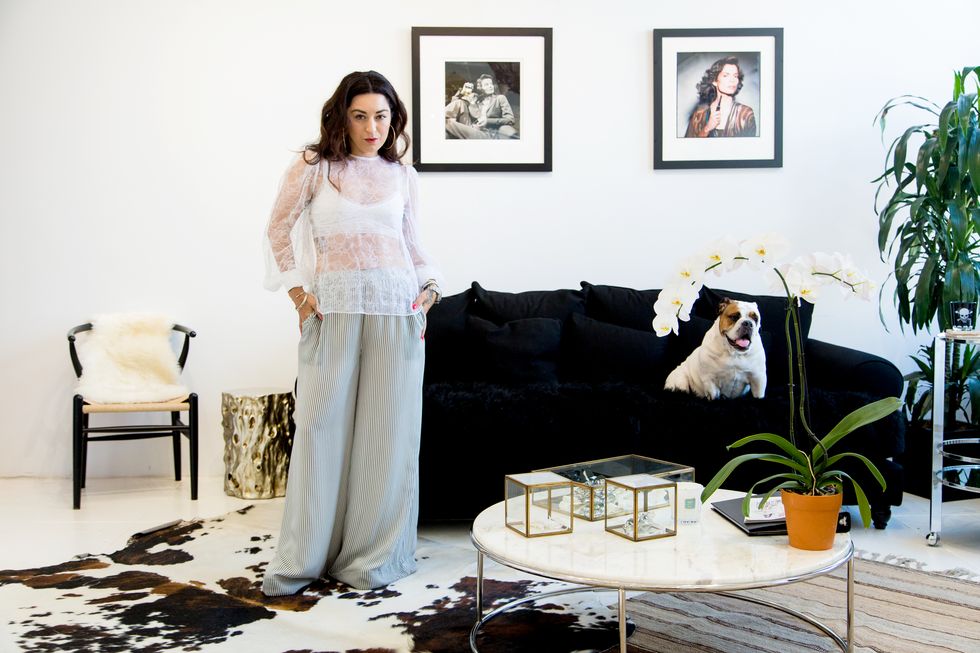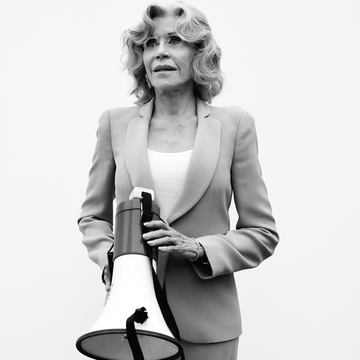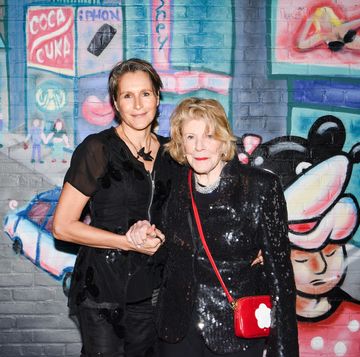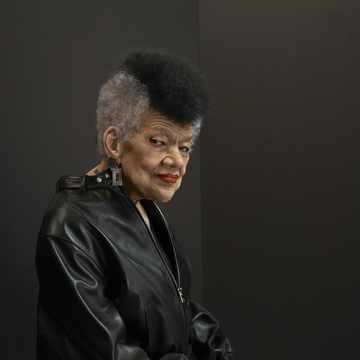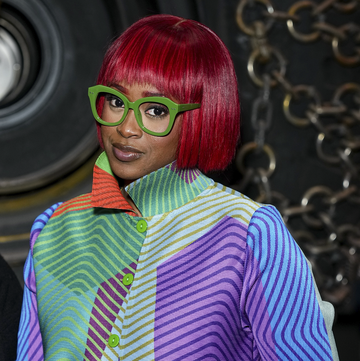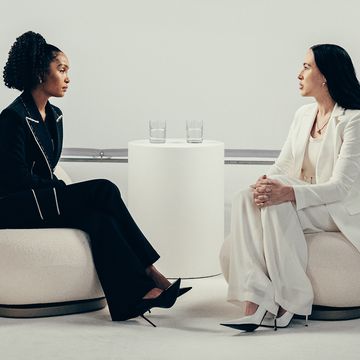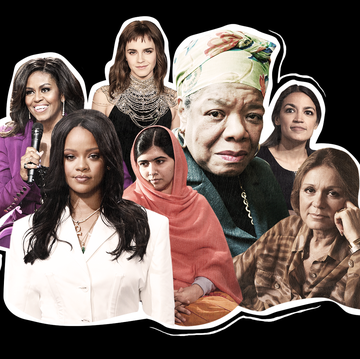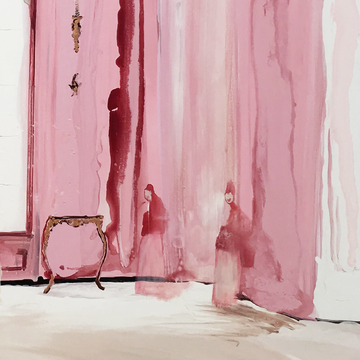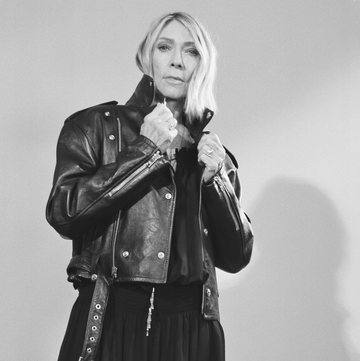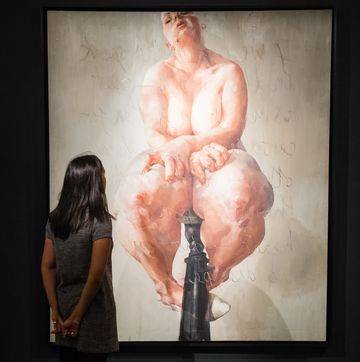People think I live this glamorous life because of social media and the press. But behind those selfies and photo shoots is not a confident woman who "has it all"—it's a contrived image I used to create a brand. This has been my most guarded secret. At 33 years old, I'm ready to share my story.
The struggle, or should I say battle, started in elementary school when I was in fifth grade. Bullies would call me fat and most days I would go home in tears. Looking back, I realize I wasn't fat at all, but being picked on made me pick apart my own appearance. It began to dictate everything I did—I would compare myself to my friends, to models in magazines, to girls on television. It didn't help that I started riding horses competitively (where being tall and thin is a plus) when I was 11 years old. Standing at 4'9", I was constantly told that my body was less than ideal for a rider; as though I didn't already scrutinize my build everyday.
Understandably, I was hesitant to pursue a career in fashion. I lived in fear of not being accepted: I was too chubby, not "chic" enough, not "cool" enough. But I wanted a chance to start afresh, somewhere where I could "reinvent" my look. So when I was offered a job in New York after graduating from the Fashion Institute of Design and Merchandising in Los Angeles, I grabbed the opportunity and moved within weeks of my interview. I was well aware of my body and my need to fit in. I had to find a way to lose weight.
I quickly became obsessed with working out. I made it part of my daily routine and when I started to lose a few pounds, I wanted to figure out how to do it faster. This was the beginning of an eating disorder that lasted nine years and is still an ongoing battle. I knew that if I dieted and worked out, I'd get skinnier faster. I started taking it to the extreme and figured out that if I only ate 500 calories a day, I'd lose weight much faster. I gave myself strict guidelines to stick to. I was probably about 130 pounds when I started counting exactly how many calories I was taking in for the day, and once I felt like I could control my meals and calorie intake, I was hooked.
On my way home from the gym one evening I decided to grab Chipotle. I ate it pretty quickly, and suddenly the idea of throwing it up made so much sense: if I ate but didn't digest my meal then I would lose weight even faster. I started restricting my daily diet to two scrambled eggs in the morning, a small cup of chicken soup (mostly broth) with no noodles for lunch, and two slices of turkey with a pickle for dinner. I then began throwing up in the evening so I wouldn't have any food in my system over night when I wasn't being active. I made sure I didn't consume more than 500 calories a day. But the bulimia quickly accelerated and I started throwing up my lunch. I was only keeping down two eggs in the morning, working off 100 more calories than I had taken in that day at the gym. I would then walk home from the Upper West Side to make sure I worked off as many calories as possible. I was consumed by controlling how quickly I could lose weight. The weight was falling off, so I kept going, trying to figure out how to make it go faster.
My boyfriend I lived with had no idea I had been bulimic for the last two years. He had no idea I was living a double life. Everyone told me how good I looked and how tiny I was. I loved it. I remember going to dinner and if I couldn't get to the bathroom within five minutes of eating I would start to get anxious. I couldn't hold a conversation because I was so scared that whatever calories I ate would somehow "stick". My leg would start shaking with anxiety. By now I was down to 105 pounds and was obsessed with dropping more weight. I could wear whatever I wanted to, and I felt like I looked good. I had not told anyone about my problem and was convinced no one knew.
At some point I reached out to my former therapist in Los Angeles for a reference in New York—I thought that I might be ready to talk to someone about my problem. But I was definitely not prepared to get better. The person I started seeing had me document what I ate and when I threw up every day for two weeks, which initially made me get worse. Seeing my meals written down triggered something, giving me a new way to keep track of how much I was eating and what else I could cut out. This was now a tool to help me get thinner. After seeing this therapist for three weeks, she told me I needed to check into an inpatient facility or she wouldn't see me anymore. I quickly grew resentful—I had come to her for help and she was kicking me out? So I became determined to keep my struggle to myself and keep going. No one was going to make me check into a facility. There was no way I could take time off work. I'd no longer have control over the situation and people would know what was going on.
I wanted help but I resented anyone who tried. I felt so alone, like no one cared enough to rescue me. And if no one noticed my weight enough to tell me I needed help then I figured I wasn't thin enough. I can't even really explain my thought process, but it made sense to me. Now I'm at a point in my life where I feel good about myself and who I am. And I feel a responsibility to come clean.
People in fashion may talk about eating disorders like it's Tuesday's news, but I could never really share my struggle with anyone. It's mentioned often but in passing like it's no big deal. Hearing how lightly people joked about it deterred me from discussing it with anyone. Now I can see signs and I know in a heartbeat when someone else is sick. Like when I always took my purse to the bathroom, making sure my eyes weren't red and my mascara was still perfect. There were times when I had been throwing up so much I would burst blood vessels on my eyelids and under my eyes from the strain. I would experiment with different things that helped me throw up faster. I would scratch my throat and it got to the point I was bringing up blood. I would take a break for the evening and start again the next day.
I don't remember if there was a single day I decided to try to get better. I had dropped to 92 pounds and my health was suffering. Slowly, I had to try and keep some food down because I was scaring myself, throwing up blood. I was exhausted from living this double life. Eventually, I decided to let myself start gaining a little weight, watching the scale closely everyday.
I think a big turn was when I started my own company, Houghton. I was my own boss and finally felt like I didn't need to be so skinny to be accepted. I could create my own image and didn't need to fit in as much as when I was working for other people. Over the past four years I have gone back and forth with my battle. There are times I would revert back to my old ways when I felt I was getting too fat. And today, still, there is not a time during the day I'm not thinking about my body, comparing it to others or over analyzing what others think about the way I look. There isn't a mirror I pass without looking at myself. But last year I looked in the mirror and hated what I saw. I was comfortable in a relationship and subsequently gained a lot of weight. When the relationship ended, I decided I needed to get my act together and care about how I looked in a healthy, nurturing way.
A few months ago a friend referred me to The DogPound, a Manhattan gym that focuses on strengthening your core from the inside out. I've never loved working out but I wanted to do something for myself—it meant I had to start treating myself like I cared. For the first time, I opened up about my struggle with eating disorders, talking with gym's founder, Kirk. It was the first time I had said it out loud. My goal was to have a healthy lifestyle: exercise, eat healthy and get to a point where weight no longer dictated my life—or what I could or couldn't wear. This sounds simple but it was a new beginning for me. I committed to myself, I decided to make appointments and stick to them. I have been going two to four times a week for about four months, working with personal trainers who have unbelievable energy, enthusiasm and knowledge. And if it means leaving work before I've finished everything to make an appointment, then that's what I have to do to make myself a priority.
Surrounding myself with the female trainers at The DogPound, who are proud of their bodies, was what I needed to see a "new version" of what healthy women look like. They are women with real bodies and they look amazing. Finally, something switched in my head. Before, I thought anybody who wasn't a runway model needed to lose weight as well. It took me eight years to realize we are not built the same as 5'11" models. It's just not realistic to think I am going to look like them.
For a long time, in our fashion bubble in New York, I always needed to lose five pounds to fit into that sample. I knew I had accomplished something when I could get into a corset of a runway sample. And for years, I used runway model measurements (32-24-34) for my own samples. It hurt my sales and press because I had made my collection to fit one per cent of women. I would hold trunk shows and no one could fit into the samples. Even celebrity stylists would tell me our samples were hard to fit on some of their clients. But I was convinced the clothes needed to be presented like this.
Then in February, for Fall/Winter 2016, I began making my samples on a size 2 fit model. Within weeks Jennifer Lopez, Kate Hudson and Selena Gomez wore the new collection on the red carpet with minor or no alterations. I know a size 2 sample is still small, but making the collection with proportions that are realistic has been successful. And now, I'm able to grade to larger sizes without completely remaking the samples. Ultimately, it was a smart business decision.
Moving forward for Fall/Winter 2017, I will be showing my new collection on "real women" who represent the real Houghton woman. I want women of all sizes, who I'm sure have their own personal body issues—but that is what I love. No one is perfect and having a group of women who are honest about their appearance is what real life is about.
Today I'm learning to love my curves and my body; I have a different idea of what the ideal body looks like: healthy, toned bodies are sexy. I love working out with my trainers and continue to be motivated as I see results. And I know that it is the same obsessive compulsive disorder that made me bulimic that is pushing me to work out more, to see results faster. It's the same voice in my head, but I am trying to navigate that voice and use it to make me healthier. I still stare at my body everyday in the mirror. I still compare myself to every other woman and I still think I could be thinner. The difference now is I want to do it the healthy way. I want to know what living is like, being able to eat and work out and maintain a body I'm happy with. I struggle to find that balance everyday.
When I look back at pictures of me in 2011, at my thinnest, I see a cry for help. But in the end, I realized no one could rescue me from myself. It's a long journey to be able to accept yourself. I want girls and boys, women and men, to know you aren't alone in this battle. We need to teach our children how powerful words are—and how to use them wisely. Bullying is the root of so many unnecessary problems. We should be building each other up, not tearing people down at the expense of someone else's well being. And we need to remember that everyone has a story you know nothing about. Never judge someone or make an assumption about what they are going through. A big misconception is that all people with bulimia and anorexia are thin. Most people are not, and they struggle daily with losing weight, with the mental game the disease plays on you.
I wish someone had tried harder to reach out to me when I was struggling. It's a hard topic to broach; one that can be extremely embarrassing. And although I'm not sure how they could have reached out to help me because I was so stuck in my ways, I wish I felt like someone cared. It was a weird balance of wanting attention but and being able to manage my struggle. Eating disorders become about control. If I went to rehab or asked for help it would have meant giving up that control. Now, I am finally at a place where I don't care who knows what I went through. I am proud of how far I have come.
I want to share my story to let other people know what I have gone through. Eating disorders affect women and men of all shapes and sizes, so if there is a way to help other people by sharing my experience, by using my platform and brand that is looked to for style and image, then that is all I can hope for.
Katharine Polk, photographed in Houghton Atelier, wearing custom Houghton. Makeup by Keri Blair, Senior Artist for M.A.C Cosmetics. Hair by Melissa Parizot for Cutler/Redken.
